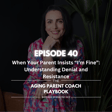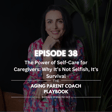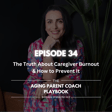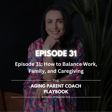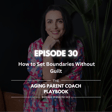Become a Creator today!Start creating today - Share your story with the world!
Start for free
00:00:00
00:00:01

Episode 15: When Worry Takes the Wheel: Anxious Attachment and Aging Parents
Do you find yourself constantly checking on your aging parent or feeling guilty for taking time for yourself? You might lean toward anxious attachment. In this episode, Dr. Barbara Sparacino dives into the strengths and challenges of anxious attachment, shares Sophia’s story of finding balance, and offers mindfulness techniques and practical tips to manage caregiving anxiety.Keywords:
Anxious attachment, caregiving anxiety, self-care, aging parents, mindfulness for caregivers, guilt management, family dynamics, caregiving burnout.Call to Action:
“Subscribe to The Aging Parent Playbook for more episodes or visit TheAgingParentCoach.com to explore coaching programs designed for your unique caregiving journey.”
Transcript
Introduction to Anxious Attachment
00:00:00
Speaker
Welcome back to the Aging Parent Playbook. I'm your host, Dr. Barbara Sparesino, and today we're exploring anxious attachment and how it influences caregiving. Anxious attachment often comes with a heightened sensitivity to relationships and a strong need to feel needed. If this sounds like you, you might find yourself feeling overly responsible for your parents' well-being. But don't worry, this episode is all about turning that emotional intensity into a caregiving strength, maybe be even superpower.
Origins and Effects of Anxious Attachment
00:00:34
Speaker
What is anxious attachment? So, anxious attachment develops when when childhood caregivers were inconsistent, sometimes attentive, other times neglectful. As a result, you might crave reassurance and struggle with feelings of abandonment.
00:00:58
Speaker
According to research, about 20% of adults have an anxious attachment style. Characterized by high empathy, but also a strong fear of failure in relationships. In caregiving, this can show up as checking in on your parent constantly, feeling guilty when taking time for yourself, struggling to establish and maintain boundaries.
Empathy, Burnout, and Boundaries
00:01:25
Speaker
so
00:01:28
Speaker
How does this impact caregiving?
00:01:33
Speaker
Your empathy is a strength, but can also lead to burnout if you're not careful. So i have ah I have a client, let's call her Sophia. She cared for her mom who had arthritis. She called her mother five times a day and felt guilty if she wasn't available 24 seven. Eventually,
00:01:57
Speaker
Sophia realized she was neglecting her own needs. With coaching, she learned to set boundaries and trust her mom's ability to manage on her own, sometimes.
Tips for Managing Anxious Attachment
00:02:11
Speaker
What are some practical tips for anxiously attached caregivers? Here's how you can manage anxious attachment while caregiving. Set realistic expectations. You can't be everything to everyone.
00:02:28
Speaker
Practice mindfulness. Use breathing exercises to ground yourself when guilt arises. Seek reassurance from others. Talk to siblings or friends for validation. And also normalization.
00:02:42
Speaker
Sometimes we we think we're in this alone, but we're struggling with a lot of the same things. Anxious attachment brings empathy and dedication, but balancing those traits with boundaries is key.
00:02:54
Speaker
Remember, caring for yourself is just as important as caring for your parents.


